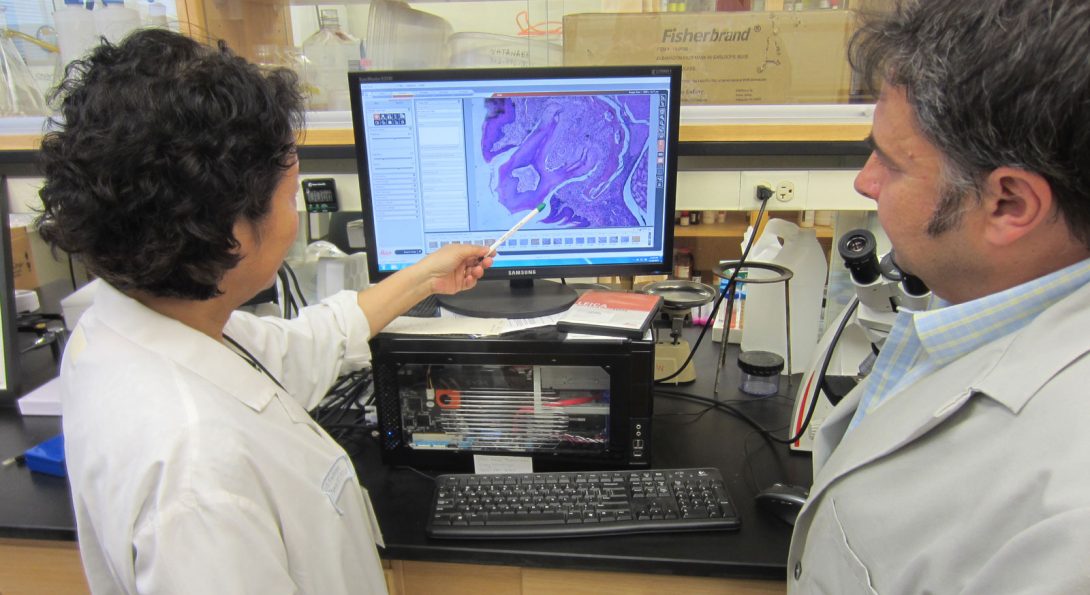Researchers Work on Connections of Periodontal Disease and Diabetes

Introduction
Drs. Vladimir Ilievski and Keiko Watanabe of Periodontics recently presented a study, “Experimental periodontitis results in beta cell compensatory alterations” in the recent UIC Diabetes and Obesity Research Day at the UIC College of Medicine.
Dr. Watanabe is a Professor, board certified periodontist, and the Director of Post Graduate Research in Periodontics at the College of Dentistry, University of Illinois at Chicago. Dr. Watanabe received her BS degree in Biological Science and DDS degree from the University of Southern California, a Certificate in Periodontics from the University of Illinois at Chicago College of Dentistry, and an MS degree in Biological Chemistry and a PhD in Molecular Genetics from the University of Illinois at Chicago. She has been teaching periodontics since 1986 and engaged in faculty practice since 2000.
Her research focuses on the effect of periodontitis on glucose homeostasis, particularly focusing on prediabetes which can be a prelude to type 2 diabetes. In previous studies, their research has found that periodontitis accelerates the onset of insulin resistance in rats fed a high-fat diet. More recent research intends to determine how periodontitis affects diabetic complications in the retina, aorta and pancreas. The goal is to identify the causes by which periodontitis influences insulin resistance, type 2 diabetes and organ damage, so clinicians will be able to screen prediabetic individuals at risk of developing the disease. From this, a plan to treat periodontal inflammation can be developed so that insulin resistance will not accelerate to diabetes.
"The prevalence of type 2 diabetes has risen dramatically as the result of an increase in obesity caused by a high-fat diet, junk food and a sedentary lifestyle," said Watanabe. Although the association between obesity, type 2 diabetes and periodontitis is recognized, she said, the underlying causes remain poorly understood.
A key challenge is to determine whether the relationship between diabetes, obesity and periodontitis is causal, Watanabe said. Most of the data linking the conditions are based on epidemiologic or cross-sectional studies, she said. While causality remains unclear, epidemiological and clinical studies have identified a clinically important association between periodontitis and Type 2 Diabetes Mellitus. Results from epidemiological studies also suggest a close association between periodontitis and both prediabetes and metabolic syndrome.
Ultimately, the laboratory wants to identify pathways and mechanisms by which periodontitis cross-talks with other organs and how this cross-talk influences glucose homeostasis such that findings can be translated into intervention for developing both periodontitis and prediabetes/diabetes.
Her laboratory has developed unique animal model systems to investigate mechanisms by which periodontitis influences whole body glucose homeostasis and associated metabolic changes over a prolonged time to mimic chronic periodontitis. Human subjects, she said, cannot be used to study the direct effect of periodontitis because it is not ethical to induce the disease.
"Several prospective studies using human subjects demonstrated that the treatment of periodontitis led to improvement of glycemic control in subjects with type 2 diabetes," she said. "However, confounding factors, such as medications used to treat type 2 diabetes, body mass index, the stage and duration of diabetes, and the onset and severity of periodontitis are difficult to assess or are broadly controlled in such studies.
More Information
Periodontal and Diabetes Research